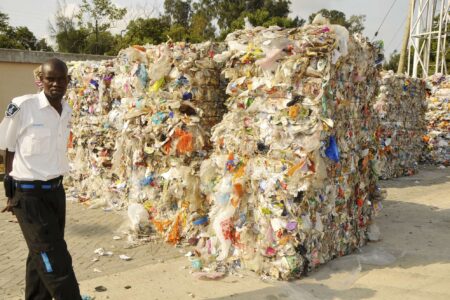editorials
Reconsider the scrapping duty on local plastics
Friday, May 12, 2023
A security guard stands next to pallets of plastic waste that were unloaded from a 40-foot container at Mitchell Cotts CFS in Kibarani shortly after it arrived from the UK. photo | NMG
Kenya became a global reference point in the fight against pollution when it banned single-use plastics seven years ago.
The ban brought a hefty fine of Sh4 million to anyone found producing or selling plastic bags as well as those found carrying plastic bags.
Although the implementation of the policy by the environmental watchdog has faced challenges, it has become largely successful after the majority of the population in cities and retail chains found alternatives, making it a normal way of life.
But the country has proposed scrapping excise taxes on domestic manufacturers, which experts say would give companies a lifeline to return to mass production, in a policy shift that runs counter to efforts to eliminate single-use plastics within Kenya’s borders.
The 2023 Finance Bill seeks to remove domestically made plastic from the excise tax because it charges “imported plastic items of Tariff Clause 3923.30.00 and 3923.90.90.”
The proposal, if it becomes law in its current form, will increase the production of local plastic that is competitive and therefore cheaper, creating jobs.
However, the increased production of cheaper plastics will exacerbate environmental pollution.
Nairobi alone generates about 2,400 tons of plastic waste per day, of which 60 percent is collected and only 10 percent recycled with the remainder being dumped or incinerated.
Kenya can’t back down from the fight against plastic, not when the whole world is taking steps to fight pollution.
